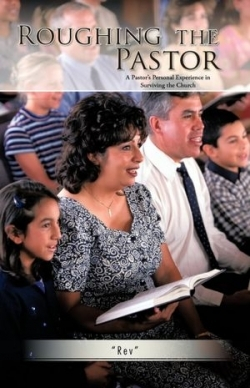Roughing the Pastor
A Pastor's Personal Experience in Surviving the Church
Leaders of any team or organization can expect to get their share of criticism. People tend to be quick to point out flaws, to dwell on bad decisions, or to vent their displeasure or frustration. But surely no members of a God-fearing Christian congregation would ever commit any antagonistic acts or verbal assaults on their leader. Or would they?
In Roughing the Pastor, one clergyman—who identifies himself only as “Rev”—relates experiences from his forty-three years as a pastor that reveal how un-Christianly church members can be. Rev began his ministerial career knowing that pastors do not enjoy a totally blissful life free of negativity or criticism. But he never imagined the utter cruelty that some of his parishioners would exhibit that would scar him deeply and affect his ministry and personal life.
After starting with positive experiences during his seminary internship at Church A (the author only refers to his churches by letters) and later at Churches B and C, Rev eventually began to encounter some of the demands that can wear a pastor down. At Church D, he ended up almost single-handedly overseeing a building project while also dealing with his members’ issues ranging from spousal abuse to early morning hospital visits. According to the author, “I was beginning to feel the emotional strain of conflict and physical weariness.”
In future church assignments, Rev would be exposed to face-to-face opposition, as he was when—after his very first Sunday service— a man approached him and said bluntly, “You don’t belong here.” Such verbal assaults and other forms of personal attack led Rev into several stages of depression that, sadly, still plague him in his retirement.
Rev cites many examples of how some church members can tear down a pastor emotionally and physically to the point where the entire congregation is affected. However, he is also quick to praise those who offered him encouragement and tried to be supportive. But there is an underlying tone of bitterness when Rev describes certain people—including ecclesiastical leaders—and events. While this may be understandable, it detracts from the points he is trying to drive home about forgiveness and compassion.
Rev uses biblical examples and verses to explain how believers can and should encourage and help their pastors, and he ends with a heartfelt challenge to his fellow ministers to support and encourage one another. His boldness in focusing attention on such a topic reveals the heart of a pastor who simply wants to make a Christian church a place of love, understanding, and forgiveness—for everyone.
Reviewed by
Jeff Friend
Disclosure: This article is not an endorsement, but a review. The publisher of this book provided free copies of the book and paid a small fee to have their book reviewed by a professional reviewer. Foreword Reviews and Clarion Reviews make no guarantee that the publisher will receive a positive review. Foreword Magazine, Inc. is disclosing this in accordance with the Federal Trade Commission’s 16 CFR, Part 255.

